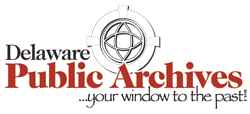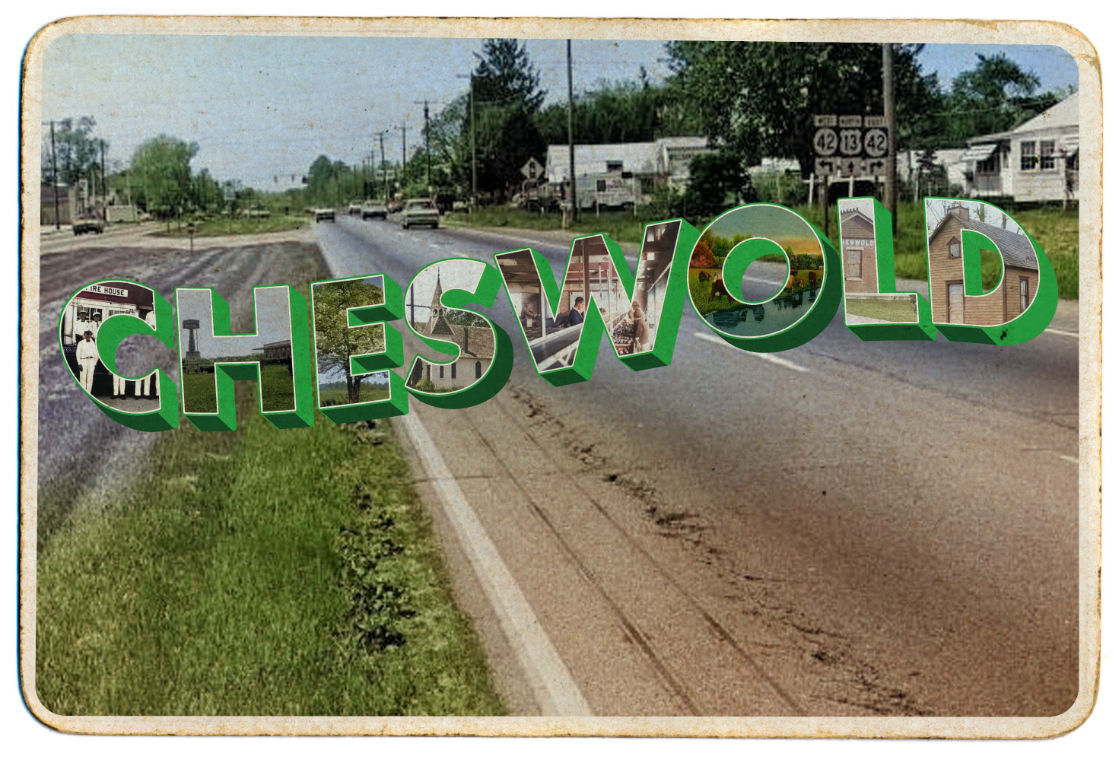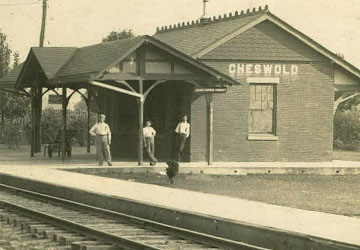


In 1856, a station stop was established on the Delaware Railroad at a location where the road that ran west from Leipsic intersected the railroad line. The community that developed here was called Leipsic Station. As it grew into a village, it would be called Moorton after John S. Moor, the owner of the general store and first postmaster. Shortly before its incorporation, a contest was held to rename the town and it became Cheswold.
As described in the 1889 Incorporating Act, the Town’s boundaries were in the shape of a parallelogram bisected by the road from Moore’s Corner (located to the west) to Leipsic. Five Commissioners were to govern the Town. They were elected by residents over 21 years of age who had paid their County assessments. The Commissioners were charged with the improvement of the streets and sidewalks in the Town and lighting of the same; the planting of street trees; the making of and repairs to public pumps; and all other matters relating to the welfare and general improvement of the Town. To accomplish these tasks, they were to meet four times yearly, passing whatever ordinances they deemed necessary. Other Town officials were an Alderman, a Constable, a Treasurer, an Assessor, a Tax Collector, and a Town Clerk. Yearly, the Assessor was to determine the amount of taxes owed which in total was not to exceed $100.1
Two years later after its incorporation, the Incorporating Act was clarified to state that only males could vote. In addition, a new provision was added to indicate that the Town’s Commissioners had the power to exempt from tax liability for a period of ten years, any manufacturing plants built within the town limits.2
In 1903, the Town was re-incorporated. Five Commissioners were to be elected by male citizens over the age of 21 who were not delinquent in paying their Town assessment. The Commission continued to meet only four times a year and their powers were not significantly expanded. The Act increased the maximum amount of funds that could be raised through taxation annually to $150 and specified the amount of the penalty in the case of non-payment of assessed taxes. It also specified that the Levy Court of Kent County was to assist the Town by providing $125 towards maintaining the streets. The duties of the other Town officials remained similar to the what was outlined in the 1889 Incorporating Act.3 Ten years later, a piece of legislation called for the Kent County Levy Court to increase their allocation towards maintaining the streets to $200 for a period of two years only.4
The Town of Cheswold re-incorporated in 1917. There were no changes to the Town’s boundaries. The most significant changes were increasing the maximum amount of taxation annually to $300 and permanently increasing the amount of the annual contribution from the Kent County Levy Court for road maintenance to $200. The other sections mirrored the language in prior Incorporating Acts.5
Twelve years later amendments were made to the 1917 Act. Females could not vote as long as they were 21 and not delinquent in paying their taxes. In the same law, the maximum taxation to be levied each year was increased from $300 to $500.6 In 1933, Cheswold was authorized to issue bonds in order to raise $6,000 to install a water plant and water mains.7 In 1945, an increase was made to the maximum amount of taxes, to $1,000.8
Sixteen years later, in 1961, the cap was increased again, to $3,000.9 In 1963, lands which were owned by the Cheswold Volunteer Fire Department comprising over 46 acres were incorporated into the Town. In addition, the manner in which delinquent taxpayers were penalized was changed.10 In 1970, the Town of Cheswold established a Board of Election and a Zoning Commission.11
The next re-incorporation took place in 1971. Although the territorial limits of the Town did not change, this Charter did change the structure of Town’s government. The Town was now to be governed by a Mayor and a Town Council made up of five members. The duties and responsibilities of each were outlined in the Charter as were their responsibilities and powers. Council meetings were to be held at least bi-monthly with guidelines set for emergency meetings. Provisions were included for making and balancing a budget which would be capped at 2% of the assessed value of property within the Town. In addition to the Mayor, other Town officials included the Town Clerk, the Town Treasurer, the Water Commissioner, and the Chief of Police. The power to zone was specifically conferred on the Town Council. Also discussed at length is its power to tax and collect delinquent taxes. The power to issue bonds to finance public projects with a useful life of more than five years as well as revenue bonds were also conveyed. The Commissioners were empowered to regulate drainage and sewer and water systems. The Town was also given the power to condemn land in order to achieve public goals.12 The 1971 Charter was first amended in 1974 when the position of Vice Mayor was added.13 The next amendment took place in 1997 when the Town’s Police Force was given jurisdiction for traffic enforcement within the Town and within one mile of its boundaries.14 The most recent re-incorporation of the Town took place in 1998. The boundaries of the Town match those in the original incorporation with the addition of the lands annexed in 1963. The power to and method of annexing land is described. The powers of the Town are all of those assigned to a municipal corporation under the Constitution of Delaware with forty-seven powers specifically enumerated. The qualifications to run for and the process for electing the six Councilmen are outlined; those voting are required to be at least eighteen years old. Duties and responsibilities of the six Councilmen are outlined in the Charter; the presiding Councilman has the title of Mayor. A Vice Mayor and a Secretary-Treasurer are also elected from within the Council. The Charter specifically prohibits any Council member from taking a paid position within the Town while they are in office or for one year thereafter. The number of Council meetings is to be determined yearly by the Council; they must be held regularly and be open to the public. Other Town officials specified in the Charter include a Town Manager, a Tax Collector, and a Town Solicitor. The method of assessing taxes is also discussed in the Charter and the maximum amount of taxes to be levied annually is limited to 1½% of the assessed value of real estate plus a per capita tax of no more than $10 per resident. The Charter also allows fees to be collected for licenses, water and sewer services, and trash collection. The Town can also borrow money, without voter approval on a short-term basis and with voter approval for longer-term borrowing. Long-term borrowing is limited to 10% of the assessed value of real estate with the Town. All monies, both regular expenditures under the budget and any borrowed monies, are subject to a yearly audit.15
Seven years after this Charter was enacted, those portions which would have prohibited a member of the Council from being appointed to a paid position in the Town within a year after serving on the Council were deleted.16
For a fully amended text of the current Charter, see http://www.Charters.delaware.gov/cheswold.shtml
CITATIONS in Del. Laws
1 18 Del. Laws, c. 650 (1889) [pp. 858-68]
2 19 Del. Laws, c. 231 (1891) [pp.458-59]
3 22 Del. Laws, c.421 (1903) [pp.863-64]
4 27 Del. Laws, c. 232 (1913) [p. 664]
5 29 Del. Laws, c. 149 (1917) [pp.456-69]
6 36 Del. Laws, c. 153 (1929) [pp. 434-35]
7 38 Del. Laws, c. 97 (1933) [pp. 424-27]
8 45 Del. Laws, c. 176 (1945) [p. 665]
9 53 Del. Laws, c. 174 (1961) [p. 512]
10 54 Del. Laws, c. 119 (1963) [pp. 369-73]
11 57 Del. Laws, c. 699 (1970) [p. 1987]
12 58 Del. Laws, c. 409 (1971) [pp.431-85]
13 59 Del. Laws, c. 388 (1974) [p. 1379]
14 71 Del. Laws, c. 151 (1997) [p. 448]
15 71 Del. Laws, c. 432 (1998) [p. 1253-88]
16 75 Del. Laws, c. 7 (2005) [p. 6]
Delaware Laws from 1935 to present can be found online at http://delcode.delaware.gov/sessionlaws/
Town of Cheswold records at the Delaware Public Archives include:
jnl/ May 8, 2018 | April 22, 2019
Related Topics: Cheswold, Delaware History, Town and City Histories